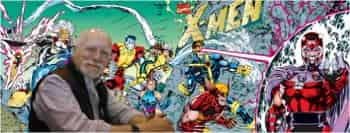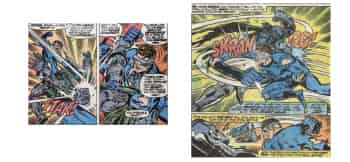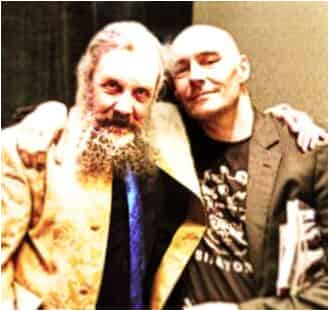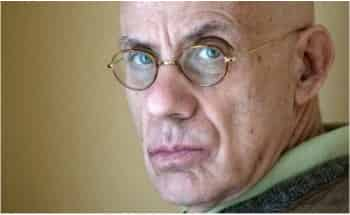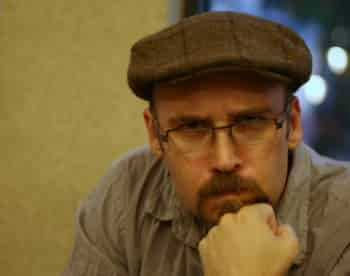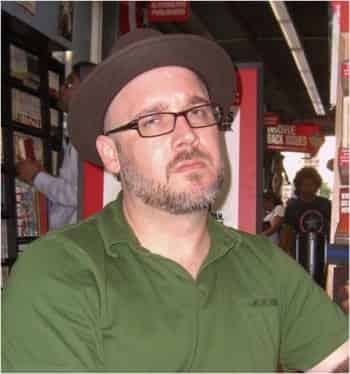
Writers
The qualities of a writer
Matt Goldberg draws this conclusion from Fincher’s almost traumatic experience filming Alien 3: “The lesson from Alien 3 was that ‘it’s always going to be your fault,’ so why not take full credit whether people go for it or not?” (“The Film of David Fincher: SE7EN,” collider.com, September 23, 2014).
This could be slogan of DIY. But we think you must already have those tendencies if you go that route. On that subject, we found this analysis of the work of Chris Claremont on the X-Men (Chris Sims, “Ask Chris # 186: The Strange Rise of the X-Men,” www.comicsalliance.com, March 7, 2014) and an interview with Rick Remender (David Dissanayake, “Rick Remender on Creator Owned Work, Creative Process & More (Part 1),” comicbook.com, September 22, 2014). Both cover a lot of ground, but they also point out the qualities an author has to have. For Remender, those are passion and quality. The idea of quality can be subjective, while passion can have various implications. But Chris Sims, in talking about Claremont’s work, mentions investment and devotion. In short, you have to be ready to dedicate time to the project because, in any case, no one else is going to do it for you.
Characters drive comicbooks
Recently, we found this analysis by Ed Campbell, pointing out that big comicbook editors (Marvel or DC) haven’t been able to create as many characters in recent years as they had in previous decades.
But does creator’s rights make the comic book industry stale? Or does it only affect the “big 2″ comic publishers, while smaller publications thrive?
If you look at Marvel and DC over the past decade, there haven’t been too many new characters come out for the comics. There were some characters who were “re-imagined” when DC launched the New 52. But on the most part there haven’t been any characters to really jump off the page and become household names. Even Marvel has introduced some new characters like Ghost Rider, Nova and Ms. Marvel. But they are just older characters with new characters portraying these long-time Marvel personas. (“Creator’s Rights = Stale Creativity,” www.comicbookdaily.com, June 20, 2014).
To find proof of this stagnation in character development, one need only think of Mark Gruenwald, who invented dozens of characters—some of them quite memorable—during his time on Captain America. There’s no sense of such a rich creative vein being tapped nowadays. New characters allow heroes to face new experiences and new adversaries that multiply fans’ reading pleasure.
Finding paradigms, exceeding one’s concepts
In an analysis of an Iron Man retrospective featuring the period when Archie Goodwin was writing, Darren says, “He (Archie Goodwin) actively works to find a paradigm that will work for Stark.” (Darren, “Archie Goodwin’s (& George Tuska’s) Run on The Invincible Iron Man – The Invincible Iron Man Omnibus, Vol. 2 (Review/Retrospective),” April 25, 2013, http://them0vieblog.com)
Darren also identifies several innovations that Goodwin introduced into the Iron Man universe. But at the same time, he shows that Goodwin did not exploit the full potential of his own ideas. Several were taken up and extended by other writers. Goodwin was introducing new concepts without developing them fully, without allowing them the dramatic charge they would have deserved. We feel this analysis also applies to several contemporary comic books. Authors are full of ideas and concepts, but we don’t often see a paradigm: a universe that fits coherently with the character and with his or her interactions with the surroundings. In our opinion, Mark Waid’s Daredevil offers this type of paradigm, where we go beyond the concept to focus on the essence of the character.

Comic books from the 70s
A lot of people judge American comic book writers from the 1970s harshly. Alan Moore was one of the fiercest critics of the early 80s. (“Alan Moore’s Lost Stan Lee Essay,” 1983, part 2 of 2). We consider the Silver Age to be a period in which the various elements in comic books were kept in check. The dialogue wasn’t overly explanatory, the descriptive boxes offered access to another level of story, and we hadn’t yet sunk to psychologically hyperanalyzing the characters. Here is a page from issue 200 of the Fantastic Four, written by Marv Wolfman, where we find such a balance.
Ideas floating in the air– Part II
A discussion took place on the web about Alan Moore having “borrowed” for a Superman story that was allegedly inspired by Grant Morrison’s Superfolks series. The author of this piece theorizes that Alan Moore may have unconsciously drawn from ideas that had struck him many years before (“Alan Moore and Superfolks Part 2: The Case for the Defence,” comcisbeat.com, November 11, 2012). In our story, “World’s Best Friends,” Benson makes a comment about his father’s upcoming death. It was only months after writing the story that we remembered that the inspiration for that conversation came from a short story in Daniel Poliquin’s collection, Le Canon des Gobelins.
Thoughts on Vilains
In one of his posts, Chris Sims (“Arcade and Why Success Doesn’t Make a Villain Credible,” www.comicsalliance.com, June 22, 2012) says the villain exists to be an obstacle for the hero. And because the hero must eventually overcome, the best villains are those that provide more interesting obstacles. Sara Lima on the other hand offers a more nuanced point of view. She feels it’s the interactions between the hero and the villain that’s important (“What Makes a Good Comic Book Rivalry?” www.comicvine.com, April 5, 2012). We agree with her use of the word “rivalry,” which is more appropriate because it doesn’t predetermine which character must eventually triumph. Within such rivalries, some characters may be amoral. As James Ellroy said, “Evil is those beings that are without conscience, those who are incapable of feeling sympathy or empathy for other human beings [translation]” (James Ellroy, « Le temps des moutons », from Petite mécanique).
The Future of Comics in the Web Ara – Part II
Graeme McMillan regrets that the industry has become a niche market (“The Beauty of Digital,” www.newsarama.com, July 11, 2012). One of the reasons frequently cited for this is price. Brubaker is nostalgic for a time when comic books cost $2.99 and he thinks the price hike is a reason for declining sales (“CR Sunday Interview: Ed Brubaker,” www.comicsreporter.com, June 24, 2102). Brian K. Vaughan agrees and so he priced the first issue of the Saga series (which contained 44 pages) at $2.99 (David Uzurmeri, “Saga: Brian K. Vaughan and Fiona Staples Bring a Stellar Sci-Fi Comic into World, www.comicsalliance.com, March 14, 2012). Higher prices don’t allow consumers buy as many issues for their activity budget (“Marvel’s Axel Alonso Made Me Laugh this Morning,” www.comicsreporter.com, July 6, 2012). Between 2000 and 2010, the price of comics increased 77% in the US (“With Great Power Comes Great Financial Hardship,” www.comicboodaily.com, June 4, 2010). And on top of the higher price, many feel there is now less and less text in comics, which means they are much faster to read. That makes them very pricey for the amount of time readers get out of them (“Where Did all the Words Go?” www.comicbookdaliy.com, May 21, 2010).
Comics don’t just compete with other superhero series and manga but with other forms of entertainment. Because readers have lots of choices, it’s easy to cut part of their budget for comic books (Ed Campbell, “Are You Willing to Make a Cut,” www.comicbookdaily.com, March 24, 2012).
Writing and Political Opinion (Part II)
Here are the words of a commentator on Frank Miller’s criticisms of the Occupy Movement: “I always separate the artist from the art; if I distanced myself from one of my heroes just because they said something I don’t agree with, I would barely have any heroes at all. It just bothers me to see Miller thumbing his nose rather abrasively at the Occupy Wall Street protesters instead of offering up any constructive criticism or intelligent insights” (“Frank Miller Rages Against The Occupy Wall Street Movement,” www.geeksofdoom.com, November 17, 2011).
We close this discussion with the view of James Ellroy, who says that Americans don’t give a rat’s ass about their writers’ political opinions (James Ellory, « Le temps des moutons », from Petite mécanique). This is an attitude we feel should be espoused by more people, regardless of nationality.
Continuity Doesn’t Mean Characters Can’t Be Transformed
In a previous comment on continuity, we cited a commenter who said that major characters have sometimes changed to the point of being unrecognizable. On this subject, Scott VanderPloeg said, “Batman can be a dark and gritty character, but can also be fun and light” (“What Happened? www.comicbookdaily.com, January 11, 2012). This phenomenon may be due to progressive intrusion of social trends into the storylines. However, what’s more destabilizing is a sudden personality reversal, which is most often due to a new writing team.
Many have said that continuity doesn’t stem from the story itself but from the writing team. Graeme McMillan highlighted that “Better continuity developing through the line” (“Is Continuity Really a Draw for Superhero Universes?” www.newsarama.com, July 26, 2012). And in an interview, Ed Brubaker confided that he was nostalgic for the time when a writer and illustrator could collaborate on dozens of issues and be free to develop more textured worlds (“CR Sunday Interview: Ed Brubaker,” www.comicsreporter.com, June 24, 2012).
Englehart Again and Always
In analyzing Volumes 4 and 5 of the Essential Avengers, one critic wrote, “in the big category, you get to watch the creators—particularly [Steve] Englehart—work out how modern comics were to be written, both the way that events took place in subplots that built to the next major crisis with one or two stories in between them…” (“CR Review: Essential Avengers, Vols. 4-5,” www.comicsreporter.com, June 4, 2012). We’ve mentioned our admiration for Englehart’s work in the past. We feel his stories are always progressing and not mired in profound psychological reflection or existential doubt.


